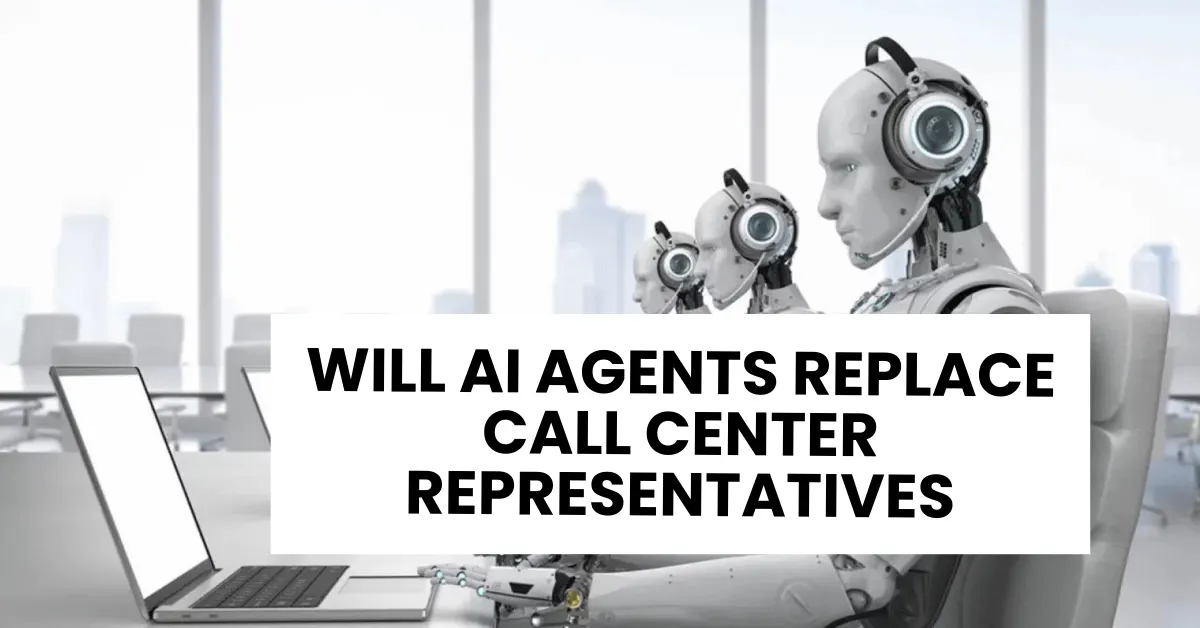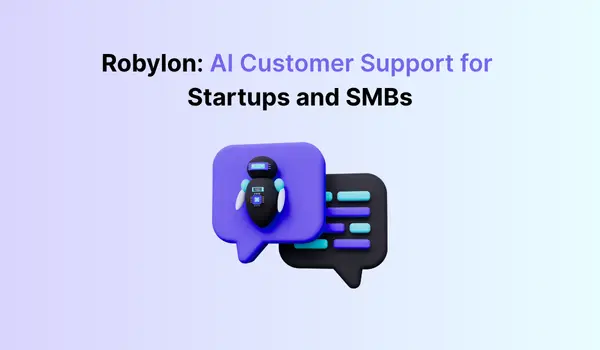TL;DR Summary
Will AI replace call center agents?
No, AI won’t replace call center agents in 2026. It will automate routine tasks, while humans handle empathy, edge cases, and trust-sensitive calls.
What is the ideal approach?
A hybrid model: AI & humans working together for scalable, high-quality customer support. AI for routing, summaries, FAQs; humans for escalations, retention, sensitive issues.
What should businesses do?
Adopt AI strategically; automate the repeatable, train your teams, and upskill them to higher-value roles.
What’s the long-term impact?
Call centers will evolve into intelligent experience hubs, driven by both machine efficiency and human empathy.
Introduction: The Inevitable Shift in Call Center Dynamics
Artificial Intelligence (AI) is rapidly transforming industries, and the call center is at the heart of this revolution. Once reliant entirely on human agents, customer service is now increasingly supported by AI-powered technologies like chatbots, voice bots, and intelligent virtual agents. It now handles high-volume, repeatable tasks (routing, FAQs, after-call summaries). This shift promises faster response times, lower costs, and improved scalability for businesses.
The winners adopt a hybrid model: AI for speed and scale; humans for empathy, judgment, and trust. In this guide, you’ll see what actually automates, what stays human, the limits & risks to watch (hallucinations, bias, privacy), and how to roll out guardrails so AI augments people instead of replacing them.
Will AI take over Call Center Agents? (Reality Check)
AI is no longer an emerging trend in call centers, it is already embedded in their day-to-day operations. Call centers, historically known for high agent turnover, inconsistent service quality, and operational inefficiencies, are leveraging AI to tackle these challenges head-on.
According to a recent market report from Fortune Business Insights, the global call center AI industry was worth $1.95 billion in 2024 and is expected to reach $2.41 billion in 2025, eventually climbing to $10.07 billion by 2032. This growth reflects a compound annual growth rate (CAGR) of 22.7% over the forecast period. North America currently leads the market, holding a 36.92% share as of 2024.
Key AI integrations include
- Intelligent Call Routing (ICR): AI analyzes a caller’s profile, intent, and sentiment in real time to route them to the most suitable agent, reducing wait times and boosting resolution speed.
- Interactive Voice Response (IVR): Voice-driven menus guide users to the right department without agent intervention, streamlining inbound queries.
- Conversational AI Chatbots: Available 24/7 across websites and messaging platforms, these bots deliver instant, context-aware support while deflecting tickets from live agents.
- Emotion AI & Sentiment Analysis: Tools like Emotion Logic help detect the emotional tone of a customer, empowering agents to tailor their responses with empathy and precision.
- Predictive Analytics: By identifying patterns in historical data, AI forecasts customer needs and recommends next-best actions in real time enhancing personalization and first-call resolution.
- Agent Assist Tools: Real-time AI suggestions support agents during live calls, offering response prompts, compliance tips, and product recommendations.
In short, while AI has not replaced human agents, it’s already become an indispensable part of modern call center operations augmenting workflows, increasing responsiveness, and enabling smarter customer engagement at scale.
Want to explore the AI voice agents transforming call centers today? Don’t miss our detailed guide to the Top AI Voice Agents.
What AI Automates Today

AI is changing how modern call centers operate. From faster support resolution to real-time insights, AI now plays a central role in improving efficiency, reducing costs, and helping teams scale without increasing headcount.
1. Automates Repetitive Workflows
AI chatbots and voice assistants can manage thousands of basic queries at once. Tasks like password resets, order tracking, appointment scheduling, and feedback collection are handled instantly; no agent involvement needed. This removes routine workload from human teams and improves first-contact resolution rates.
Example: Tools like Robylon, C-Zentrix, and Zendesk AI enable 24/7 virtual support across chat and voice, helping reduce customer wait times during peak hours.
2. Reduces Support Costs at Scale
AI-powered support systems cost significantly less than hiring additional agents. Instead of building a larger team to meet demand, companies can deploy AI to handle high volumes of requests with consistent quality. Research shows that using AI in customer support can lower operational costs by 30% to 40%.
This is especially useful for contact centers with high ticket volumes and for startups needing to scale support without increasing budget.
3. Provides Round-the-Clock Availability
AI systems do not rely on shift schedules. They operate continuously and deliver immediate responses, even during weekends or holidays. This ensures customers receive help exactly when they need it, regardless of time zone or business hours.
4. Improves Agent Performance in Real Time
AI enhances not replaces agent capabilities. Live call support tools suggest relevant information, detect sentiment, and provide real-time recommendations. This allows agents to work faster and reduce handle times without compromising on quality.
Example: Google CCAI provides in-call prompts and insights, while voice tools like NICE CXone use speech analytics to surface context-sensitive data.
5. Enhances Accuracy and Compliance
Unlike human agents, AI systems are not impacted by fatigue or distractions. They deliver consistent, rule-based responses and update CRM records automatically. This improves data hygiene, reduces compliance risk, and ensures every conversation aligns with internal policies.
6. Enables Predictive and Proactive Service
AI can analyze behavior patterns, historical interactions, and real-time signals to anticipate customer needs. This allows teams to reach out before problems escalate or identify upsell and retention opportunities based on trends.
Example: Predictive call routing directs customers to the right agents based on issue complexity, past behavior, or sentiment reducing transfers and improving satisfaction.
7. Scales Support for BPOs and Startups
For startups and BPOs handling variable volumes, AI provides instant scalability. Whether dealing with 500 or 500,000 queries per month, AI can dynamically adjust without requiring new hires or infrastructure changes.
Bonus: AI Boosts Customer Experience, Too
AI doesn’t just help your internal team, it transforms the customer experience
- Faster resolutions mean less frustration.
- Omnichannel support lets customers get help via chat, voice, email, or social media.
- Smart recommendations and personalization elevate interactions from functional to delightful.
- Real-time follow-ups and summaries ensure no detail is missed improving transparency and trust.
Voice Bots vs Chatbots in Call Centers: When Each Wins
While both tools serve customer-facing roles, AI chatbots and voice AI have distinct applications.
A hybrid approach that integrates both often delivers the most seamless customer experience.
AI vs Human Agents: A Functional Comparison
As AI becomes a powerful force in contact centers, the question is not whether AI will replace human agents, it’s how each can do what they do best.
Breakdown: Who Handles What Best?
Where AI Shines: Speed, Scale & Consistency
AI-powered agents are unbeatable when it comes to speed, memory, and multitasking. They can process thousands of simultaneous requests, recall entire interaction histories, and maintain brand consistency; all without breaks, burnout, or emotion-driven errors.
Where Humans Still Lead: Emotion, Nuance, and Relationship Building
Despite rapid advances, AI voice bots still struggle with the subtleties of human conversation. They may misunderstand sarcasm, emotion, or layered queries; especially when the interaction requires sensitivity, reassurance, or complex negotiation.
The Rise of the Hybrid Contact Center
The most effective call centers in 2026 will be those that blend the strengths of both AI and human agents. This hybrid model uses AI for operational efficiency and humans for emotional engagement.
- AI handles: Call routing, basic queries, knowledge lookups, sentiment analysis.
- Humans handle: Customer retention, escalations, personalized experiences, and creative problem-solving.
How to Adopt AI Safely: Guardrails, Redaction, Audit Logs, Opt-outs
While AI is transforming call centers at record speed, it also brings critical challenges that businesses must not ignore. Let’s unpack the darker side of AI-driven customer support and what companies can do to mitigate the downside.
The Human Cost: Job Displacement & Changing Roles

Perhaps the biggest fear surrounding AI in call centers is its impact on jobs. As AI automates routine tasks, companies require fewer human agents to handle first-level customer queries.
AI is more likely to augment than fully replace human agents in the short term. Forward-thinking companies must focus on
- Reskilling agents for higher-value tasks
- Being transparent about AI adoption
- Involving staff in AI integration strategies
Limitations of AI: Where Machines Still Fall Short
AI tools in call centers are impressive but not perfect. Key limitations include
- Lack of empathy: AI can't understand or respond to emotional nuance the way humans do.
- Struggles with complexity: AI is great at pattern recognition, but it can fail when faced with unique, out-of-the-box customer problems.
- Misinterpretation & hallucination: AI models can generate inaccurate or misleading responses, which can hurt customer trust and brand perception.
- Language and cultural gaps: NLP models may miss context or nuance in multilingual or culturally specific conversations.
While these flaws can be mitigated with improved training data and hybrid workflows, they remain critical challenges in high-stakes or regulated industries like finance and healthcare.
Ethical & Legal Risks: Data Privacy, Bias, and Accountability
With AI systems collecting and analyzing vast amounts of customer data, data privacy is now a front-and-center concern. Key risks include;
- Data breaches due to weak encryption or poorly secured systems
- AI bias resulting from unrepresentative or skewed training data
- Lack of explainability, making it hard to understand or justify AI decisions
- Misinformation: AI tools may inadvertently provide inaccurate or misleading responses that damage customer trust
To mitigate these risks, companies should
- Comply with strict data regulations like GDPR, HIPAA, or the EU AI Act
- Adopt transparent AI systems that offer explainability and auditability
- Regularly audit algorithms for bias and fairness
- Set clear accountability frameworks for errors or failures in AI decision-making
The Hybrid Contact Center: AI + Human Roles & Handoffs

The call center of the future is not about man vs. machine. It is about smart collaboration where humans and AI agents work side by side to deliver faster, more personalized, and scalable support. The result?
The Rise of Cyborg Agents: Humans Enhanced by AI
Forget the sci-fi tropes. “Cyborg agents” are not about androids taking over, it is about real people using AI as a second brain.
With tools like smart CRMs, intent detection systems, and predictive analytics, call center agents can
- Anticipate customer needs based on behavior and history
- Get real-time suggestions for the next best action
- Automatically generate call summaries, schedule follow-ups, and update CRM data
AI becomes the co-pilot handling the routine and recommending the strategy, while the human agent focuses on delivering empathy, nuance, and judgment.
Looking to understand more about AI voice agents? We have drafted a comprehensive guide about AI Voice Agents.
AI Enables a New Era of Call Center Talent
AI makes room for a new generation of support professionals by changing the scope of their responsibilities. Instead of handling routine queries, agents can now grow into roles such as
- Reskilling and upskilling agents into QA, training, or AI-ops roles
- Agent coaches who supervise AI and guide its behavior
- Data-driven specialists who use AI dashboards to improve service quality
- Customer success experts focused on retention, upsells, and satisfaction
Rather than shrinking the workforce, AI has the potential to elevate it, turning entry-level jobs into long-term careers in a tech-enhanced support environment.
Real-World Impact: How Is AI Delivering Results

Here is what early adopters of AI-powered customer support are already achieving
- 40% reduction in support costs after automating tier-1 queries using AI chat and voice bots
- 60% faster resolution times by integrating AI with live agent workflows
- 70% of customer queries handled without human intervention, freeing agents for high-value conversations
- 24/7 multilingual support, helping teams scale across regions without
Robylon: Your Partner in Building AI-Augmented Support Teams
Robylon AI is redefining the future of customer service with AI agents built to support both inbound and outbound operations across all major communication channels including chat, voice, WhatsApp, email, and web widgets. Designed for modern teams, Robylon’s conversational AI streamlines ticket handling, boosts agent productivity, and delivers personalized support at scale. Whether you are looking to reduce response times, improve CSAT, or scale support across time zones, Robylon helps your team deliver human-first service, powered by AI.
What Makes Robylon Stand Out
- Cross-channel flexibility: Provide seamless service through voice, chat, WhatsApp, email, and other key platforms.
- Multilingual capabilities: Communicates naturally in over 40 global languages, enabling support across diverse markets.
- Custom workflows: Build tailored support flows that reflect your brand’s tone and operational logic.
- CRM & helpdesk integration: Easily plugs into tools like Zendesk, HubSpot, and custom systems no disruption, just acceleration.
- Hybrid & fully automated modes: Resolve repetitive queries 100% autonomously, or loop in agents when human input is needed.
Proven Results from Real Customers
- 80%+ ticket automation rate for common queries like order tracking and FAQs
- 60% faster ticket resolution through AI-guided workflows
- 30% reduction in customer support costs with no compromise on service quality
Robylon empowers teams to do more with less; smarter workflows, happier customers, and round-the-clock support.
Want to see how AI is transforming customer support in action? Explore Robylon AI’s Customer Stories →
Conclusion
The future of customer support is hybrid as AI handles the repetitive stuff - routing tickets, answering FAQs, and working 24/7. While humans step in for what matters the most - empathy, creativity, and complex problem-solving. The call centers that win in 2026 and beyond will be
- Faster with automation
- Smarter with data
- More human with every interaction
Final takeaway: AI + Humans = Better customer experiences. Embrace the synergy, not the fear. The future of support starts now.
Ready to future-proof your call center with AI?
Let Robylon AI help you strike the perfect balance between automation and empathy.
FAQs
Can AI handle both inbound and outbound call center tasks?
Yes. Modern AI tools are capable of managing both inbound tasks (like resolving support tickets) and outbound tasks (such as customer follow-ups, surveys, or lead qualification), making them versatile across contact center operations.
What’s the ROI of using AI in call centers?
Companies using AI in customer service report benefits like a 30-40% reduction in support costs, 60% faster resolution times, and up to 80% ticket automation. These gains lead to better agent efficiency, lower churn, and improved CSAT scores.
How secure is AI in handling customer data?
Leading AI providers implement strict data protection measures, including encryption, role-based access, and compliance with regulations like GDPR and HIPAA. However, businesses should always evaluate vendors for transparency, auditability, and bias mitigation in AI models.
Can AI handle multilingual customer support?
Yes. Many AI solutions, like Robylon AI, support conversations in multiple languages over 40 in Robylon’s case. This enables businesses to serve global customers efficiently without expanding regional teams.
Is AI in call centers a threat to BPO jobs?
While AI may reduce the need for human agents in some low-skill roles, it also creates new opportunities in quality assurance, AI operations, coaching, and customer success. Rather than eliminating jobs, AI is changing them, shifting the focus from manual tasks to higher-value responsibilities
How does AI improve customer experience in call centers?
AI improves customer experience by reducing wait times, enabling 24/7 support, offering instant responses, and delivering consistent service across channels. It also helps personalize interactions through predictive analytics and sentiment detection, creating smoother and more responsive support journeys.
What types of call center tasks can AI automate?
AI can automate repetitive and rule-based tasks such as answering frequently asked questions, tracking orders, collecting feedback, routing calls, and summarizing conversations. Advanced AI tools also assist live agents with real-time suggestions and sentiment analysis during calls.
Will AI completely replace human call center agents?
No, AI will not completely replace human call center agents. While AI can handle routine tasks like FAQs, routing, and ticket updates, human agents are still essential for complex problem-solving, emotional support, and nuanced conversations. The most effective approach is a hybrid model where AI and humans work together.








.webp)
.png)



.webp)













